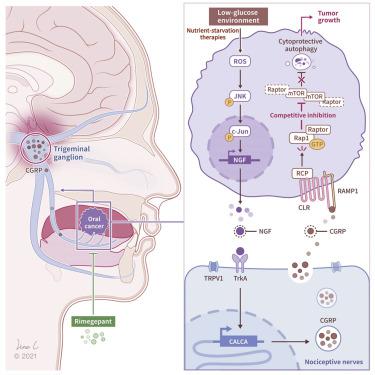Cell Metabolism ( IF 27.7 ) Pub Date : 2022-11-16 , DOI: 10.1016/j.cmet.2022.10.012 Yu Zhang 1 , Chengzhong Lin 2 , Zheqi Liu 1 , Yiting Sun 3 , Mingtao Chen 1 , Yibo Guo 1 , Wei Liu 1 , Chenping Zhang 1 , Wantao Chen 1 , Jian Sun 1 , Ronghui Xia 4 , Yuhua Hu 4 , Xi Yang 1 , Jiang Li 4 , Zhiyuan Zhang 1 , Wei Cao 1 , Shuyang Sun 1 , Xu Wang 1 , Tong Ji 1

|
Although nutrient-starvation therapies can elicit strong anti-tumor effects in multiple carcinomas, it has been convincingly demonstrated that cancer cells exploit the tumor microenvironment to thrive in nutrient-poor environments. Here, we reveal that cancer cells can co-opt nociceptive nerves to thrive in nutrient-poor environments. Initially examining the low-glucose environment of oral mucosa carcinomas, we discovered that cancer cells employ ROS-triggered activation of c-Jun to secrete nerve growth factor (NGF), which conditions nociceptive nerves for calcitonin gene-related peptide (CGRP) production. The neurogenic CGRP subsequently induces cytoprotective autophagy in cancer cells through Rap1-mediated disruption of the mTOR-Raptor interaction. Both anti-glycolysis and anti-angiogenesis-based nutrient-starvation therapies aggravate the vicious cycle of cancer cells and nociceptive nerves and therapeutically benefit from blocking neurogenic CGRP with an FDA-approved antimigraine drug. Our study sheds light on the role of the nociceptive nerve as a microenvironmental accomplice of cancer progression in nutrient-poor environments and upon nutrient-starvation therapies.
中文翻译:

癌细胞选择伤害性神经在营养不良的环境中和营养饥饿疗法中茁壮成长
尽管营养饥饿疗法可以在多种癌症中产生强烈的抗肿瘤作用,但令人信服的是,癌细胞利用肿瘤微环境在营养贫乏的环境中茁壮成长。在这里,我们发现癌细胞可以选择伤害性神经在营养不良的环境中茁壮成长。最初检查口腔粘膜癌的低葡萄糖环境,我们发现癌细胞利用 ROS 触发的 c-Jun 激活来分泌神经生长因子 (NGF),它调节伤害性神经以产生降钙素基因相关肽 (CGRP)。神经源性 CGRP 随后通过 Rap1 介导的 mTOR-Raptor 相互作用的破坏在癌细胞中诱导细胞保护性自噬。基于抗糖酵解和抗血管生成的营养饥饿疗法都会加剧癌细胞和伤害性神经的恶性循环,并且在治疗上受益于使用 FDA 批准的抗偏头痛药物阻断神经源性 CGRP。我们的研究揭示了伤害性神经在营养不良环境中作为癌症进展的微环境帮凶以及营养饥饿疗法的作用。































 京公网安备 11010802027423号
京公网安备 11010802027423号